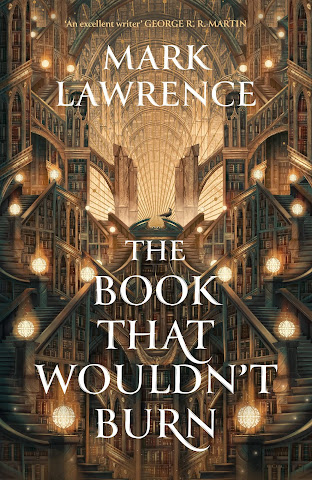Blog Listing
- @Number71
- Before We Go blog
- Best Fantasy Books HQ
- Bookworm Blues
- Charlotte's Library
- Civilian Reader
- Critical Mass
- Dark Wolf's Fantasy Reviews
- Everything is Nice
- FanFiAddict
- Fantasy & SciFi Lovin' News & Reviews
- Fantasy Cafe
- Fantasy Faction
- Fantasy Literature
- Gold Not Glittering
- GoodKindles
- Grimdark Magazine
- Hellnotes
- io9
- Jabberwock
- Jeff VanderMeer
- King of the Nerds
- Layers of Thought
- Lynn's Book Blog
- Neth Space
- Novel Notions
- Only The Best Science Fiction & Fantasy
- Pat's Fantasy Hotlist
- Pyr-O-Mania
- Reactor Mag
- Realms Of My Mind
- Rob's Blog O' Stuff
- Rockstarlit Bookasylum
- SciFiChick.com
- SFF Insiders
- Smorgasbord Fantasia
- Speculative Book Review
- Stainless Steel Droppings
- Tez Says
- The Antick Musings of G.B.H. Hornswoggler, Gent.
- The B&N Sci-Fi & Fantasy Blog
- The Bibliosanctum
- The Fantasy Hive
- The Fantasy Inn
- The Nocturnal Library
- The OF Blog
- The Qwillery
- The Reading Stray
- The Speculative Scotsman
- The Vinciolo Journal
- The Wertzone
- Thoughts Stained With Ink
- Val's Random Comments
- Voyager Books
- Walker of Worlds
- Whatever
- Whispers & Wonder
Blog Archive
-
▼
2025
(91)
-
▼
August
(12)
- SPFBO Champions League Review:: Orconomics by J. Z...
- Review: The Summer War by Naomi Novik
- Book Review: The Bewitching by Silvia Moreno-Garcia
- Review: Voidwalker by S.A. MacLean
- Book review: The Midas Rain by Adam Roberts
- SPFBO Champions League Interview: Morgan Stang
- Review: The Will of the Many by James Islington
- Review: What Fury Brings by Tricia Levenseller
- Book review: Anji Kills a King by Evan Leikam
- SPFBO Champions League Review: Where Loyalties Lie...
- SPFBO Champions' League Interview: Michael McClung...
- Book review: Saint Elspeth by Wick Welker
-
▼
August
(12)
1) The Storm beneath The World by Michael R. Fletcher – This was an incredibly unique story about an anthromorphic insect civilization & easily the best story that has sprouted form the mad Canadian’s mind. Can’t wait to read the sequel and see how Fletcher ends it all.
2) The Doors Of Midnight by RR Virdi – The sequel to The First Binding was in everyway a sequel that outshone its predecessor. The brilliance of the author’s prose & plotting skills were already visible in the preceding title but in this one, he took things to a new level. The 3rd volume in the Tales Of Tremaine is easily one of my most anticipated reads whenever it releases.
3) Herald by Rob J. Hayes – The beginning of a new epic fantasy from one of my favourites is always a cause to celebrate. With the Godeater saga, Rob plans to go the GRRM route and has written a story that is simultaneously unfolding across three millennia.
4) The Last Shield by Cameron Johnston – Cameron Johnston is a huge fan of David Gemmell and in this book, he was able to give us a heroic fantasy story & a stoic female MC who absolutely would have done the big man proud.
5) Blood Over Bright Haven by M.L. Wang – This book was a fantasy title that originally was released in 2023 but I got to it in 2024. M.L. Wang’s BOBH was a fascinating tapestry about academia, racism and xenophobia while giving us a fascinating world. An incredibly different follow up to Kaigen but retaining all of the author’s signature style.
6) The Book That Wouldn't Burn by Mark Lawrence – This was another 2023 title which I was only able to read a year later after its release. The Library trilogy book 1 is possibly the most meta story that Mark Lawrence has written & another feather in his already shining cap.
7) Fool’s Promise by Angela Boord – Angela Boord’s 2nd volume of the Eterean saga showcased exactly why we loved Fortune’s Fool. With more worldbuilding & complex characters, accompanied by stellar prose, this sequel proved why AB needs to be celebrated by more readers.
8) How To Become The Dark Lord And Die Trying by Django Wexler – This was a funny story that exceeded my wildest expectations as the author really went all in with its zany premise. Filled with snark, humour & a lot of fun, this is one series that I couldn’t get more of.
9) Mushroom Blues by Adrian M. Gibson – Adrian M. Gibson’s debut was a sleek hybrid mixing fantasy, SF, & Noir with a complex world scenario. It was also very polished & hence was the FBC finalist for SPFBOX. If you haven’t read this one yet, you need to jump on it.
10) The Hunter’s Gambit by Ciel Pierlot – I was made aware of this book thanks to my blogmate Caitlin, and her review precisely encapsulates what this book is about. Evil vampires, bloody action, a morally grey protagonist made this standalone a quick and fast read. Ciel Pierlot absolutely nailed this dark fantasy tale & I hope we get more stories within this milieu.
The Sword of Kaigen & Where Loyalties Lie - Special Editions Interview with Bryce O'Connor (interviewed by Mihir Wanchoo)
I love best-of lists and reading wrap-ups. As 2023 comes to a close, it's time to sit, think, and write such a post. I always do it with pleasure.
It was a rather good year. I've read a lot and discovered some excellent reads. Contrary to previous years, my 2023 wrap-up is dominated by fun, pulpy, and entertaining, with just a few "serious" works thrown in the mix.
I guess it's because the year has been intense and I simply gravitated toward easier, more accessible books. I've rediscovered my love for thrillers and mysteries but I won't list them because it's a fantasy website, after all. That said, some of my most thrilling reads this year were all thrillers. I'll mention a few standouts here, in case someone here is interested: Dark Places by Gillian Flynn, False Witness by Karin Slaughter, The Kind Worth Killing by Peter Swanson, and The Traitor by Ava Glass.
I hope some of you will find inspiration here and maybe discover something worth attention :)

Official Author Website
Read FBC's Review of The Sword of Kaigen
 |
| Misaki by Coralie Jubénot (Merwild) |
 |
| The Duel by Arielle Werthaim (arielle_the_merms) |
Order The Sword of Kaigen over HERE (USA) & HERE (UK)
Not the book, though, but my review. I join The Sword of Kaigen fan club and I plan to force anyone listening to try it. I won’t lie, I hoped I would identify its unforgivable flaws and enumerate them to show how insightful I am. I did find some, but they didn’t stop me from loving the book.
The Sword of Kaigen introduces memorable and relatable characters and throws them into disastrous conflict with a powerful enemy. Kusanagi Peninsula, renowned for its unstoppable warriors who bend elements to their will, stands between the Empire and invaders. Fourteen-year-old Mamoru represents the Matsuda clan proudly and with full conviction. A new student, Kwang Chul-hee, who transfers from outside of the province challenges his beliefs. What if everything their academy teaches is just propaganda? And what if the Empire treats legendary Kaiganese warriors as cannon fodder?
Mamoru’s mother, Misaki, doesn’t deny the accusations. Once an accomplished warrior, she’s sacrificed everything to marry into the Matsuda family and provide it with sons. Her past haunts her and when she receives a letter warning her that the entire Kusanagi Peninsula is in danger, she acts. But will her husband, cold, distanced and powerful warrior, approve of a woman fighting for her own?
The Sword of Kaigen focuses on a mother and son. Their histories and arcs are inseparable and strongly connected. Misaki gives Mamoru the strength to challenge his beliefs about the world and his place in it. Mamoru’s conflict with his father gives Misaki the strength to challenge social norms and rediscover her inner warrior. As we watch them grow closer to each other, it’s hard not to admire Wang’s knack for characterization and conveying strong and believable emotions. It works against the reader - when the enemy strikes and mayhem begins no one is safe. The story takes wild and dark turns.
At 651 pages, the book rarely feels too long (once you get past a somewhat tepid beginning). It contains so much. The complexity of the Kaiganese traditions and genealogy. Martial arts, elemental magic, and epic battles. Small graceful details and moments of silence and reflection between powerful climaxes. The protagonists of The Sword of Kaigen are masters of theonite power known as jiya, the ability to control water and ice. They’ve honed their skills and mastered complex techniques that allow senior Matsuda clan’s members (Takeshi and Takeru) to display godlike powers. The epic battle that happens halfway through the book contains so much pure awesomeness (but also tragedy) that the book is worth reading for it alone.
As I mentioned I found some flaws. The beginning is slow and filled with heavy info-dumping. It requires patience and trust from the reader. Heavy use of honorifics and fictitious therms can feel confusing. The redemption arc of the character you loathe (unless you’re a misogynistic boor) felt rushed and unconvincing. I liked the result but not the path that has led to a sudden change in his relationship dynamics with his partner and others. The last chapters weren’t necessary for this story to work but I understand they had to be included to tie TSoK to Wang’s Theonite series. I’m ok with it.
On the other hand, Wang plays with tropes and makes a middle-aged mother a compelling and memorable character you root for. The other character starts as a young prodigy and just when you think you know what will happen, Wang will crush your expectations. Important characters die. Some deaths are brutal and gruesome, some tragic. One of them will tear you apart and is, for me, one of the most beautiful death scenes in all fantasy.
So, while the pacing could be tighter, the characters and action-scenes are fantastic. Wang's writing conveys raw emotions well and some twists will crush you. And that is a sign of greatness.





















